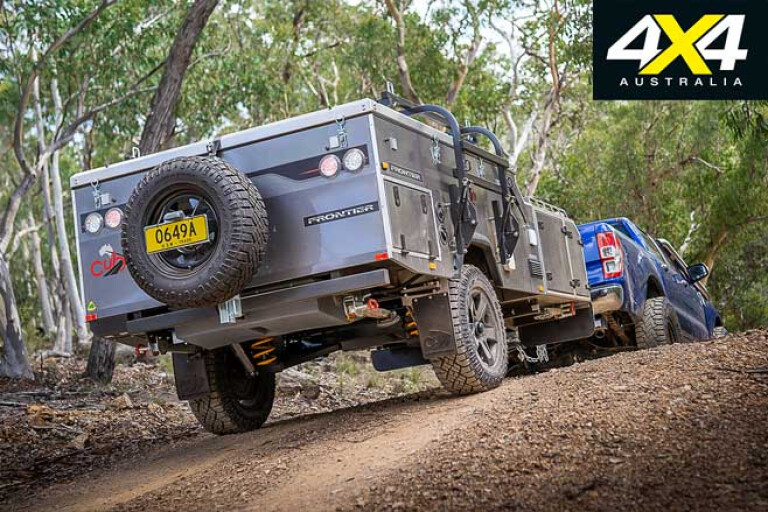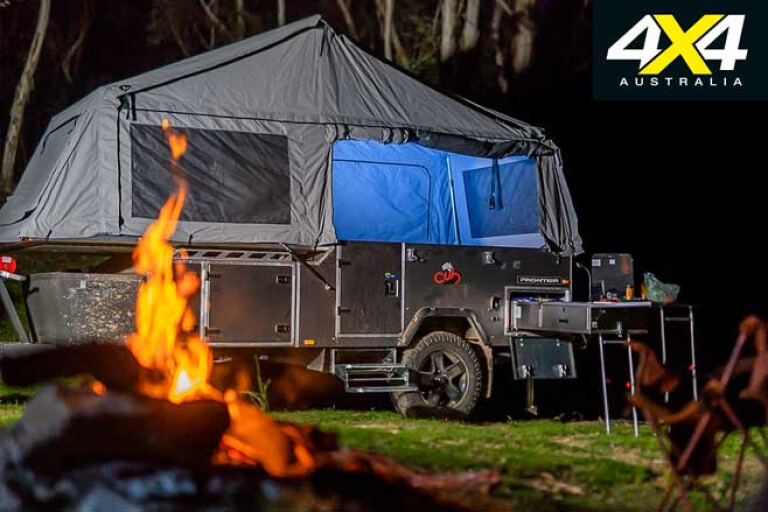
THE term Frontier conjures up ideas of America’s Wild West; a vast untamed opportunity waiting beyond the horizon.
In more recent times it has been applied to the endless reaches of the cosmos, the farthest we’ve reached and something we’ll continue to push. It’s fitting then that, after 51 years of designing and manufacturing camper trailers in Australia, Cub Campers would name its latest development the Frontier.

The Frontier, like most of Cub’s line-up, is designed and manufactured in Australia, meaning things can be rapidly prototyped and ideas developed and evolved, rather than the ‘take it or leave it’ mentality many importers are forced to deal with.
Forward-fold campers are almost the standard in camper trailers these days; they offer a comfortable night’s sleep, ample storage for all the odds and ends required to head bush, a dining area that’s up and out of the elements, and they’re all (with very few exceptions) an absolute pain in the arse to set up.
Complicated pole setups, spreader bars and weird sliding contraptions? The Frontier has none of that. What it does have is the quickest set-up time of any forward-fold on the market; the kind of camper you can pull up in the rain and be out of the elements in three minutes. Let us explain.
The Set-Up

BEFORE we get bogged down in the details, let’s address the secret weapon in the Frontier’s arsenal: the quickest set-up time on the market. A typical forward-fold camper trailer has a set-up time of around 15 minutes or up to about an hour if you’re adding the awning. The Frontier takes 15 minutes with the awning or three minutes without it.
In typical Cub fashion, the way it achieves this is unbelievably simple. The tent and pole structure have been designed in such a way that it pulls itself tight, without the need for spreader bars and additional poles. Six clasps along the flanks pop open, the silent winch up front cranks the lid over, and you’re done. Inside, a pair of gas struts automatically push the tent into place at the rear, while the section above the bed head is angled just enough to pull tight without additional poles.

By comparison, a typical forward-fold requires two upright poles above the bed head, four spreader poles along the roof and another two upright poles at the rear, all manually adjusted with plenty of trial and error to find which pole goes where.
The awning is a similar clever-yet-simple design. A typical awning has hooks on the roof poles that need to be fed through holes in the canvas and attached to the poles inside the camper, and it usually requires two people and a whole heap of yelling.
The Frontier features Velcro on the outside. Even the upright poles at the end have wing-nuts on top to stop the canvas flopping off while you’re trying to position it all. If it sounds like basic stuff, that’s because it is, and it’s something you can’t fully appreciate unless you’ve been close to divorce setting up an imported forward-fold. The Frontier shows how easy set-up can be.
Welter Weight

A TOTAL of 400kg might not sound like a lot; it’s less than half of the payload of most common dual-cab utes and slightly more than a middle-aged American on a mobility scooter.
However, the reality in off-road land is it’s a huge amount to lug around – think: a steel bullbar with a winch, storage drawers, fridge, long-range fuel tank and a set of 33-inch tyres. It’s coincidentally also the weight difference between the featherweight Cub Frontier and some of its more portly competitors. The cub weighs just 1222kg, with some of its rivals weighing up to 1600kg.
How have they done it? Simple: engineering. Things are exactly as stout as they need to be to last the distance, and as a direct result the weight savings are huge.

What does that mean for you? Well, that’s 400kg less holding you back while your right foot buries you in sand and hundreds of wide-eyed mouth-breathers upload your photo to ‘I got bogged at Inskip Point’. It’s also 400kg less weight that your CVs have to pull up a near vertical High Country track into camp … and 400kg less sliding you into a Cape York riverbank.
Ground clearance isn’t huge and the width is noticeable in tight tracks, but all of that pales in comparison to the huge benefits a light overall weight has to off-road ability, especially when you factor in the towball weight only adds 137kg to the rear of your tow-tug – we’ve seen north of 200kg from some competitors.
Are you going to be the tip of the spear forging a new track in Arnhem Land? Probably not, but if you want to confidently cross a desert, the Frontier will be more than up to the task.
Storage and Practicality

PRACTICALITY means more than just how fast a camper sets up; it’s how all of the individual components work together. After all, a camper that sets up in 30 seconds but requires you to disconnect it from the 4x4 to turn on the water might not be that appealing.
Without a doubt the Frontier’s big selling point is the interior, and it doesn’t disappoint in either storage or practicality. The second bed quickly converts back and forth into a dining area. Where competitors have tables more rickety than a politician’s promises, the Frontier unit is sturdy, bolted to the floor and gas-assisted to easily spring into place with the push of a button.

There’s ample storage along the flanks, too, to stuff items you need to carry but never want to see again, like bearings and belts, and a unique cubby hole storage set-up along the foot of the bed is the perfect place to stash clothing and cooking gear.
The Frontier’s kitchen is extensive and well-equipped. The focal point is the Dometic three-burner stove, but the real winner is the optional-to-the-kitchen Truma hot-water system which also feeds into an external hot shower. There’s a knurled texture to both the base kitchen and the fold-out table, keeping it looking tip-top without the usual scratches stainless steel kitchens are prone to.

The base camper is equipped with both a DC to DC Projecta charger as well as a 240V Projecta unit with an external input, so you don’t need to open the camper to plug a lead in. There’s also solar input, so if you’re parked on the west coast of the Cape for weeks at a time you can trickle charge the batteries without needing to jerry-rig anything. Our demo unit was fitted with the aptly named Frontier Pack, which adds an additional 100amp/h battery to provide an expected fridge (95-litre) run-time of roughly five days in summer.
The pack also expands water storage to 180 litres from the stock 100 litres, as well as adding a stainless steel pull-out pantry; although, in all fairness, pantry space is still limited, so some items may end up in the back of your 4x4. The drawer bar stores a hand water pump for trackside washing, two 4kg gas bottles with internal plumbing, and room for two 20-litre jerry cans.
Front of the pack

LIKE 4x4s, camper trailers are uniquely designed to suit specific uses. You wouldn’t spend a year living out of a box trailer with a rooftop tent, and you wouldn’t go pulling a caravan through Gun Shot – not unless you’re chasing internet fame. With that in mind, the Frontier needs to be viewed and judged through the needs it actually does suit, not the ones it doesn’t.
If you’re on the road for weeks at a time or you need to quickly set up the camper before the kids start destroying the back of your 4x4, the fast set-up times will no doubt put huge ticks in the yes column for you. Likewise, the light weight makes for easy towing in soft sand, perfect for island hopping in south-east Queensland or traversing many of the endless red sand deserts throughout outback Australia.

Storage is light-on compared to some other offerings, but if paired with a well-equipped 4x4 it should pose no issue (we simply used a space case in the back of the tow-tug as a pantry). You’ll also need to consider that the Frontier is wide and has relatively exposed flanks, so if you’re punting your camper through ruts and riverbanks you might be better off trading comfort for capability.
At around 30 per cent more than comparable imported campers, the Frontier gives away very little in off-road ability of affordability, and what you get in return is comfort, quick set-up times and quality you simply won’t find anywhere else.
.jpg)
Cub Frontier camper trailer specifications
TARE: 1222kg
ATM: 1750kg
SUSPENSION: Independent coil spring
BRAKES: 12-inch electric
COUPLING: AL-KO off-road ball coupling
CHASSIS: Galvanised RHS 100x50x3mm
DRAWBAR: Galvanised RHS 100x50x3mm
BODY: Steel and aluminium baked enamel
WHEEL/TYRE: 17-inch alloy/ 285/65 Goodyear Duratrac
BOX SIZE (L/W/h): 3680/1950/1550mm
LENGTH: 5500mm
TENT SIZE (L/W): 3680/1950mm
GAS CYLINDERS: 2x4kg gas bottles included
WATER: 1x100L + 1x80L with hand pump and 12V pump
COOKTOP: Three-burner gas
KITCHEN: Stainless steel slide-out
BATTERY: 2x100amp/h AGM deep-cycle
PRICE: $42,496
HITS: Fastest set-up time on the market; Light weight; Aussie built; Simple design; Packed with creature comforts
MISSES: Large off-road footprint
RATINGS
Off-road ability: 7/10
Fit for purpose: 10/10
Comforts: 10/10
Self-sufficiency: 9/10
Value for money: 8/10
Ease of use: 10/10
Build quality: 8/10
Innovation: 9/10
Fit & Finish: 8/10
X-Factor: 8/10

COMMENTS